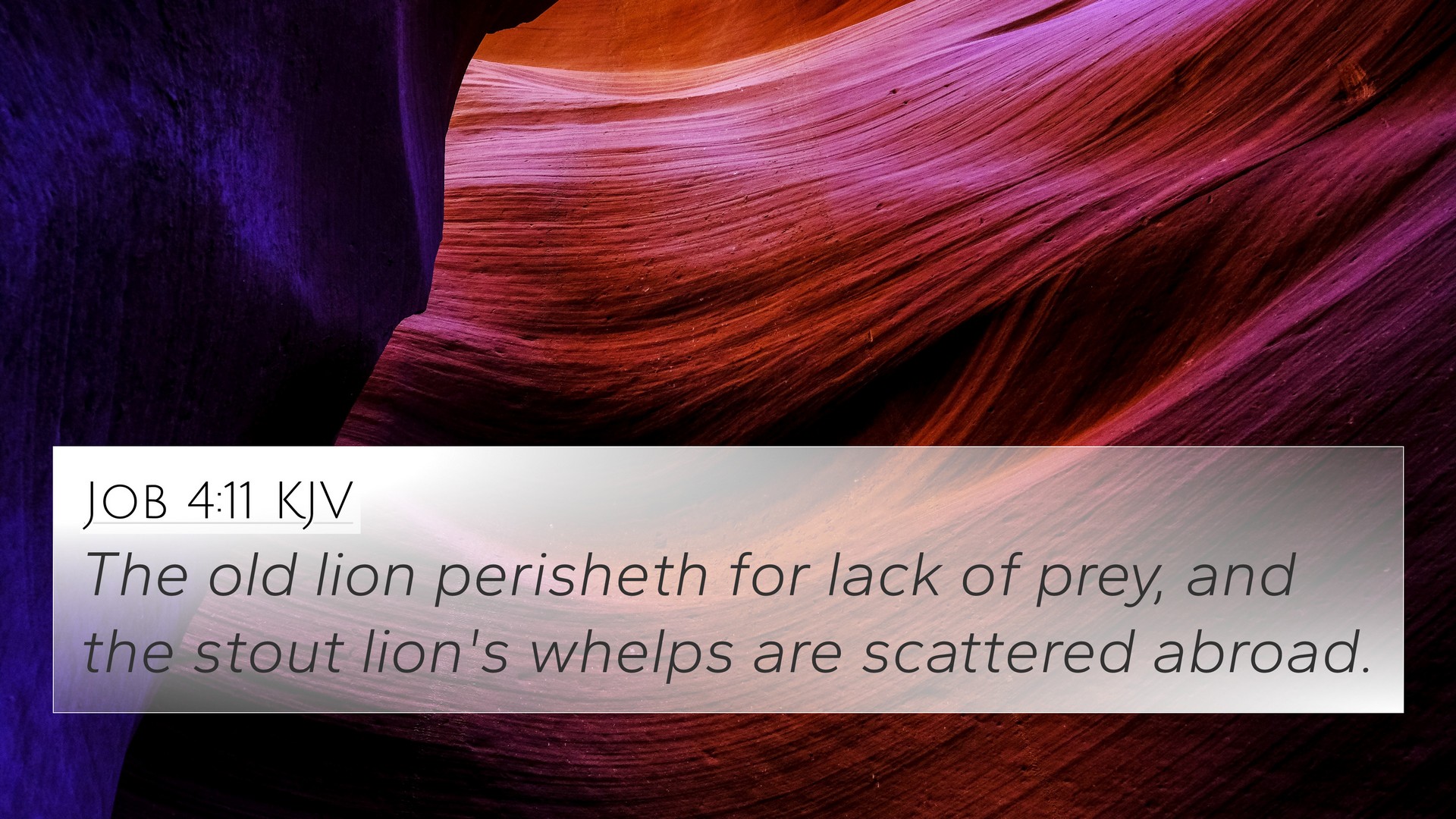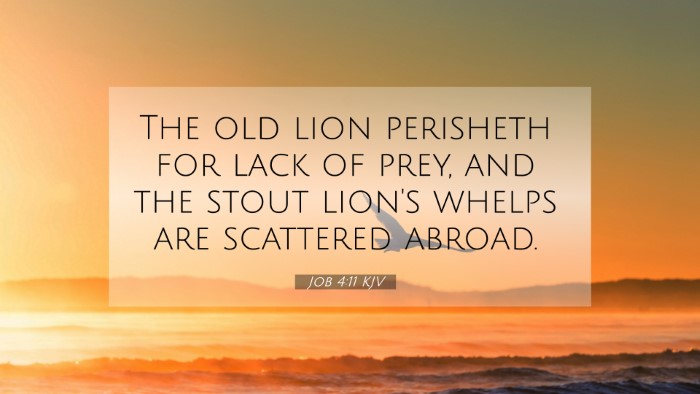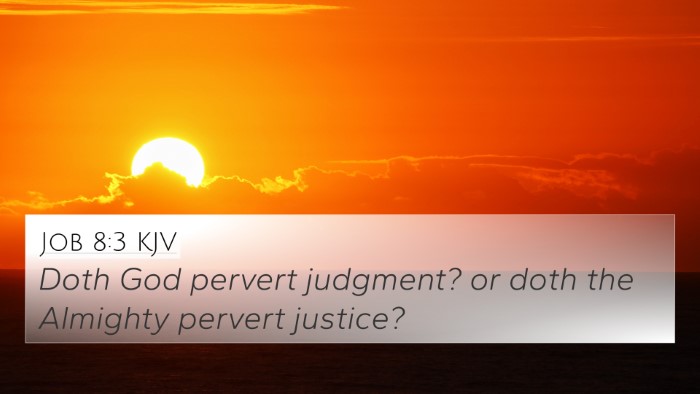Old Testament
Genesis Exodus Leviticus Numbers Deuteronomy Joshua Judges Ruth 1 Samuel 2 Samuel 1 Kings 2 Kings 1 Chronicles 2 Chronicles Ezra Nehemiah Esther Job Psalms Proverbs Ecclesiastes Song of Solomon Isaiah Jeremiah Lamentations Ezekiel Daniel Hosea Joel Amos Obadiah Jonah Micah Nahum Habakkuk Zephaniah Haggai Zechariah MalachiJob 4:11 Similar Verses
Job 4:11 Cross References
The old lion perisheth for lack of prey, and the stout lion's whelps are scattered abroad.
Uncover the Rich Themes and Topics of This Bible Verse
Listed below are the Bible themes associated with Job 4:11. We invite you to explore each theme to gain deeper insights into the Scriptures.
Job 4:11 Cross Reference Verses
This section features a detailed cross-reference designed to enrich your understanding of the Scriptures. Below, you will find carefully selected verses that echo the themes and teachings related to Job 4:11 KJV. Click on any image to explore detailed analyses of related Bible verses and uncover deeper theological insights.
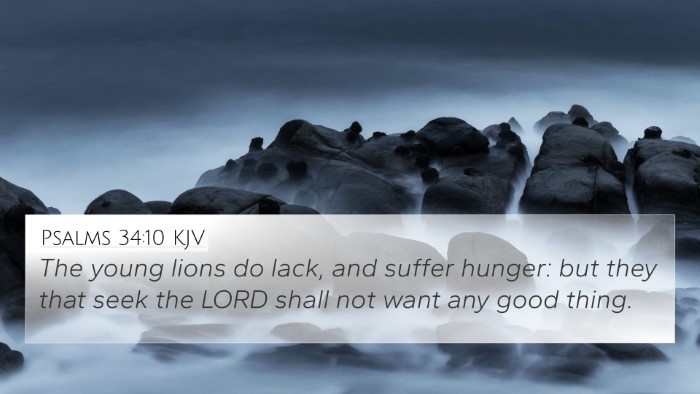
Psalms 34:10 (KJV) »
The young lions do lack, and suffer hunger: but they that seek the LORD shall not want any good thing.
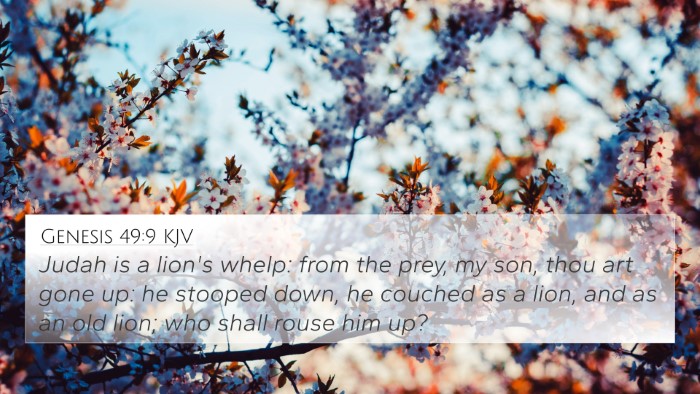
Genesis 49:9 (KJV) »
Judah is a lion's whelp: from the prey, my son, thou art gone up: he stooped down, he couched as a lion, and as an old lion; who shall rouse him up?
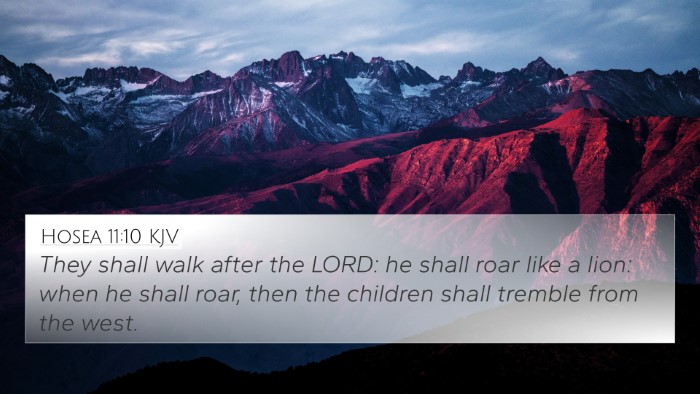
Hosea 11:10 (KJV) »
They shall walk after the LORD: he shall roar like a lion: when he shall roar, then the children shall tremble from the west.
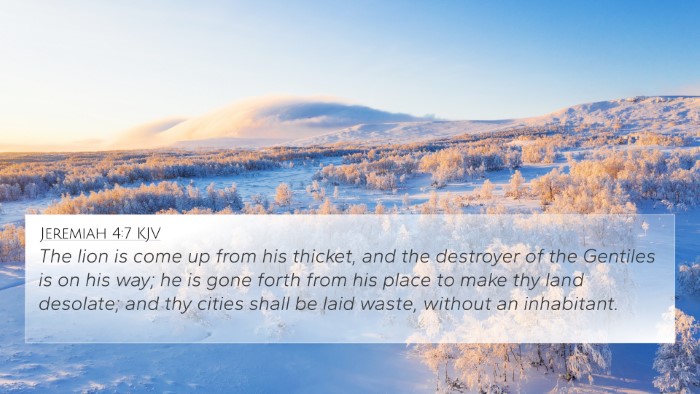
Jeremiah 4:7 (KJV) »
The lion is come up from his thicket, and the destroyer of the Gentiles is on his way; he is gone forth from his place to make thy land desolate; and thy cities shall be laid waste, without an inhabitant.

Psalms 7:2 (KJV) »
Lest he tear my soul like a lion, rending it in pieces, while there is none to deliver.
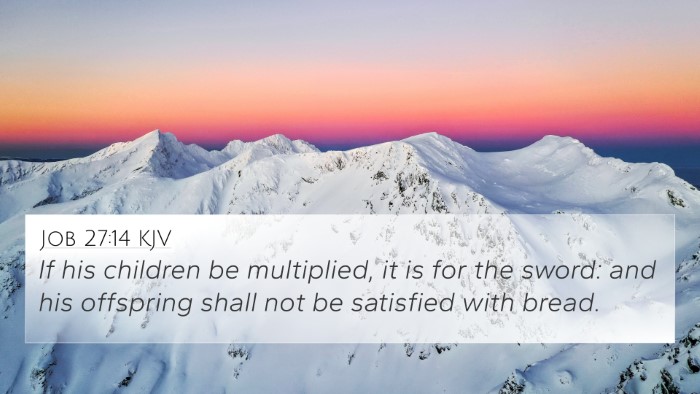
Job 27:14 (KJV) »
If his children be multiplied, it is for the sword: and his offspring shall not be satisfied with bread.
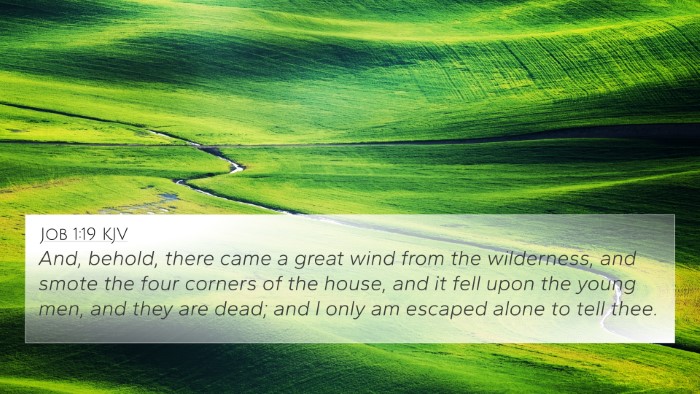
Job 1:19 (KJV) »
And, behold, there came a great wind from the wilderness, and smote the four corners of the house, and it fell upon the young men, and they are dead; and I only am escaped alone to tell thee.
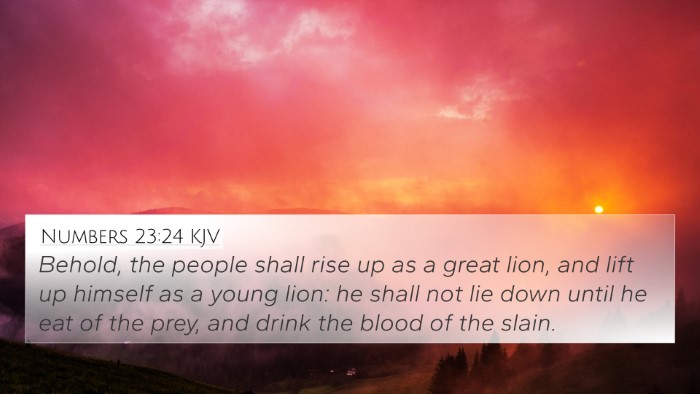
Numbers 23:24 (KJV) »
Behold, the people shall rise up as a great lion, and lift up himself as a young lion: he shall not lie down until he eat of the prey, and drink the blood of the slain.
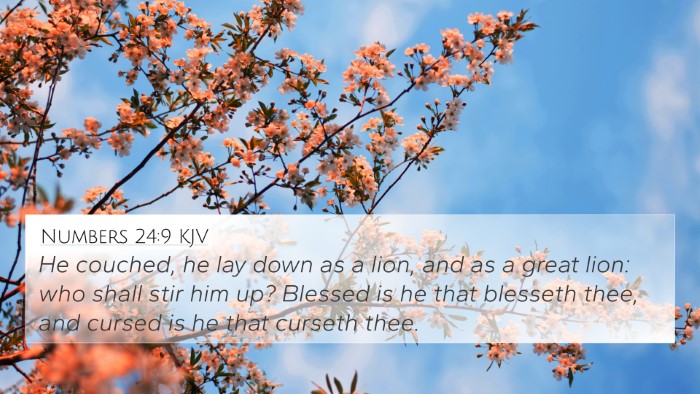
Numbers 24:9 (KJV) »
He couched, he lay down as a lion, and as a great lion: who shall stir him up? Blessed is he that blesseth thee, and cursed is he that curseth thee.

2 Timothy 4:17 (KJV) »
Notwithstanding the Lord stood with me, and strengthened me; that by me the preaching might be fully known, and that all the Gentiles might hear: and I was delivered out of the mouth of the lion.
Job 4:11 Verse Analysis and Similar Verses
Understanding Job 4:11
The verse Job 4:11 states:
"The lion has roared: who will not fear? The Lord God has spoken: who can but prophesy?"
This scripture reveals profound truths about the authority and power of God, as well as the response of His creation to divine pronouncements.
Summary of Meaning
Job 4:11, spoken by Eliphaz the Temanite, suggests a strong comparison between the fierceness of a lion and the overwhelming presence of God. Eliphaz begins by describing the lion as a majestic creature, whose roar instills fear. This analogy is then wonderfully intertwined with God’s voice, indicating that when God speaks, authority and prophetic revelation follow.
Commentary Insights
Matthew Henry's Commentary
Matthew Henry elaborates on the metaphor of the lion, stating that just as the lion is the king of beasts, so is God supreme over all creation. Henry emphasizes the majesty and terror of God's voice, suggesting that it compels a reaction from those who hear it, much like a lion's roar initiates fear in all that are close. He notes that Eliphaz’s statement serves to remind Job and the listeners of God's inescapable authority.
Albert Barnes' Notes
Albert Barnes connects the historical context of Eliphaz’s speech to the broader narrative of Job. Barnes highlights the role of fear in scripture—pointing out that true wisdom begins with the fear of the Lord. He interprets the lion as a continuing metaphor for God’s righteous judgment, and stresses that when God speaks, it is for a purpose, often leading others to prophesy or declare truths concerning His character.
Adam Clarke's Commentary
Adam Clarke examines the rhetorical nature of the verse, suggesting that Eliphaz uses powerful imagery to instill fear and reverence for God. Clarke illustrates that the lion's roar symbolizes an undeniable affirmation—just as animals respond instinctively to danger, so humanity is drawn to respond to divine commands. He discusses how this verse encapsulates the relationship between God’s majesty and human responsibility to recognize and yield to it.
Bible Cross-References
- Amos 3:8 - "The lion has roared; who will not fear?" This verse echoes the fear induced by the lion, connecting to God's call to Israel.
- Jeremiah 25:30 - "The Lord will roar from on high, and from His holy dwelling He will utter His voice." This reinforces the idea of God's powerful pronouncement bringing about fear.
- Isaiah 31:4 - "As a lion growls, a great lion over its prey." Here again the metaphor of the lion is employed to illustrate God's protective but fearsome nature.
- Joel 3:16 - "The Lord roars from Zion and utters His voice from Jerusalem." This speaks to God’s voice being powerful and decisive, similar to the lion's roar in Job 4:11.
- Psalm 29:4 - "The voice of the Lord is powerful; the voice of the Lord is full of majesty." This parallels the prophetic nature of divine speech depicted in Job.
- 1 Peter 5:8 - "Be sober-minded; be watchful. Your adversary the devil prowls around like a roaring lion." This introduces a contrast between divine authority and the dangers posed by sin.
- Proverbs 19:23 - "The fear of the Lord leads to life." Here we see the beneficial side of that fear which aligns with Job's recognition of God's might.
Connections between Bible Verses
Job 4:11 serves as a powerful illustration of the characteristics of God’s communication and authority. The cross-references provided illustrate a thematic connection of divine power expressed through the metaphor of the lion, emphasizing the reverence and fear this should evoke in humanity. Such connections highlight consistent Biblical themes regarding God's sovereignty and the human response to His voice.
Theological Implications
The implications of Job 4:11 extend beyond mere storytelling; they speak to the nature of God and His interaction with humanity. The verses referenced and the accompanying interpretations lend themselves to a deeper theological reflection on the reverence due to God. They invite believers to explore how God’s declarations are not only meant to instill awe but also to guide moral and spiritual living.
How to Use this Knowledge
For those seeking to strengthen their understanding of biblical texts, using tools for Bible cross-referencing becomes crucial. Here are some practical steps on how to utilize these tools effectively:
- Utilize a Bible concordance: This can help locate verses that contain similar words or themes.
- Engage in cross-reference Bible study: When reading a verse, look for footnotes or parenthetical citations that link to related scriptures.
- Explore thematic Bible verse connections: Identify common themes, such as authority, fear, or response to God, across different books of the Bible.
- Enhance your studies with comprehensive reference resources: Consult commentaries, theological dictionaries, and online databases.
